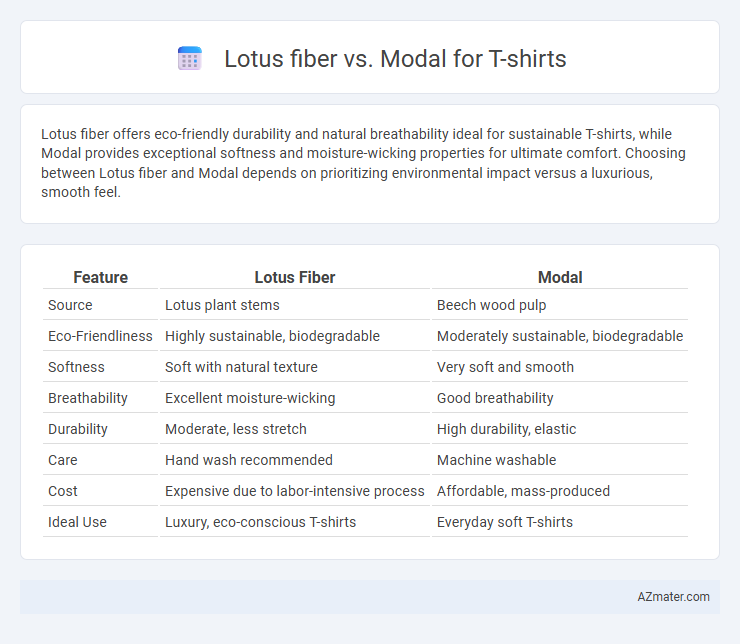Lotus fiber offers eco-friendly durability and natural breathability ideal for sustainable T-shirts, while Modal provides exceptional softness and moisture-wicking properties for ultimate comfort. Choosing between Lotus fiber and Modal depends on prioritizing environmental impact versus a luxurious, smooth feel.
Table of Comparison
| Feature | Lotus Fiber | Modal |
|---|---|---|
| Source | Lotus plant stems | Beech wood pulp |
| Eco-Friendliness | Highly sustainable, biodegradable | Moderately sustainable, biodegradable |
| Softness | Soft with natural texture | Very soft and smooth |
| Breathability | Excellent moisture-wicking | Good breathability |
| Durability | Moderate, less stretch | High durability, elastic |
| Care | Hand wash recommended | Machine washable |
| Cost | Expensive due to labor-intensive process | Affordable, mass-produced |
| Ideal Use | Luxury, eco-conscious T-shirts | Everyday soft T-shirts |
Introduction to Lotus Fiber and Modal
Lotus fiber, derived from the stems of lotus plants, offers exceptional breathability, natural UV protection, and eco-friendly sustainability, making it an innovative choice for premium T-shirts. Modal, a semi-synthetic fiber made from beech tree pulp, is renowned for its silky softness, high moisture absorption, and durability in fabric blends tailored for comfortable everyday wear. Both fibers emphasize natural origins and comfort but differ significantly in processing methods and environmental impact.
Origins and Production Processes
Lotus fiber, derived from the stems of lotus plants, involves a labor-intensive harvesting process where fibers are extracted manually, soaked, and then spun into yarn, emphasizing eco-friendly, sustainable methods primarily practiced in regions like Myanmar and India. Modal fiber, a type of semi-synthetic rayon made from beech tree pulp, undergoes a chemical-intensive production involving cellulose extraction and spinning, resulting in a soft, breathable fabric widely manufactured in European countries. The distinct origins--natural lotus plant versus wood-based cellulose--and the contrasting handcrafted versus industrialized processes influence the environmental footprint, texture, and breathability of T-shirts made from these fibers.
Environmental Impact Comparison
Lotus fiber, derived from lotus stems, offers a highly sustainable alternative to Modal by requiring minimal water and pesticides during cultivation, significantly reducing its environmental footprint. Modal, a semi-synthetic fiber made from beech tree pulp, involves chemical-intensive processing and higher water usage, leading to greater environmental impact despite its biodegradability. Choosing Lotus fiber for T-shirts supports eco-friendly fashion by promoting renewable resources and lowering greenhouse gas emissions compared to traditional Modal production.
Fiber Structure and Comfort
Lotus fiber features naturally hollow, breathable fibers that enhance moisture absorption and ventilation, providing superior comfort in T-shirts. Modal fibers, derived from beech tree cellulose, possess smooth, fine, and highly absorbent filaments, resulting in a soft, silky touch ideal for sensitive skin. The unique porous structure of lotus fiber promotes better airflow compared to modal, offering cooler wearability in warm conditions.
Durability and Longevity
Lotus fiber offers exceptional durability due to its natural cellulose structure, making it resistant to wear and tear over time. Modal, a semi-synthetic fiber derived from beech wood, provides excellent longevity with strong tensile strength and maintains color vibrancy after multiple washes. Both fibers excel in durability, but lotus fiber's natural robustness gives it an edge for sustainable, long-lasting T-shirts.
Moisture-Wicking and Breathability
Lotus fiber offers excellent moisture-wicking properties due to its natural porous structure, allowing sweat to evaporate quickly and keeping the skin dry during physical activity. Modal, derived from beech tree pulp, is highly breathable and absorbs moisture efficiently, providing a soft and cool feel ideal for everyday comfort. Both fibers enhance T-shirt performance in moisture management, but lotus fiber excels in rapid drying and natural ventilation, making it preferable for activewear.
Dye Affinity and Color Retention
Lotus fiber exhibits excellent dye affinity due to its natural porous structure, allowing it to absorb colors deeply and resulting in vibrant hues that last longer without fading. Modal, a type of semi-synthetic cellulose fiber, also offers high dye affinity but tends to retain color more uniformly because of its smooth surface and consistent fiber structure. In terms of color retention, lotus fiber maintains its vibrancy through multiple washes given its strong fiber integrity, while modal excels in preventing color deterioration under frequent laundering and exposure to sunlight.
Sustainability and Ethical Considerations
Lotus fiber is a sustainable textile made from the fibers of lotus stems, known for its biodegradability and low environmental impact during production, making it an eco-friendly choice for T-shirts. Modal, a type of rayon derived from beech tree pulp, offers softness and durability but involves chemical processing that raises concerns about water pollution and sustainability unless sourced from responsibly managed forests. Ethical considerations favor lotus fiber for its natural extraction methods and minimal waste, while Modal's sustainability improves with certifications like FSC and closed-loop production systems.
Price and Market Availability
Lotus fiber T-shirts are generally more expensive due to limited production and complex extraction processes, positioning them as niche luxury items. Modal T-shirts offer a more affordable alternative with wide market availability, benefiting from mass production and strong supply chains. The price gap reflects Lotus fiber's exclusivity and sustainability appeal versus Modal's accessibility and softness.
Choosing the Best Fiber for T-Shirts
Lotus fiber offers exceptional breathability and natural antibacterial properties, making it ideal for moisture-wicking T-shirts in hot climates. Modal, derived from beech trees, provides a silky smooth texture with excellent durability and color retention, ensuring long-lasting softness and vibrant prints. Choosing between lotus fiber and modal depends on prioritizing eco-friendly moisture management versus enhanced comfort and longevity in T-shirt fabric.

Infographic: Lotus fiber vs Modal for T-shirt
 azmater.com
azmater.com